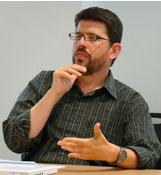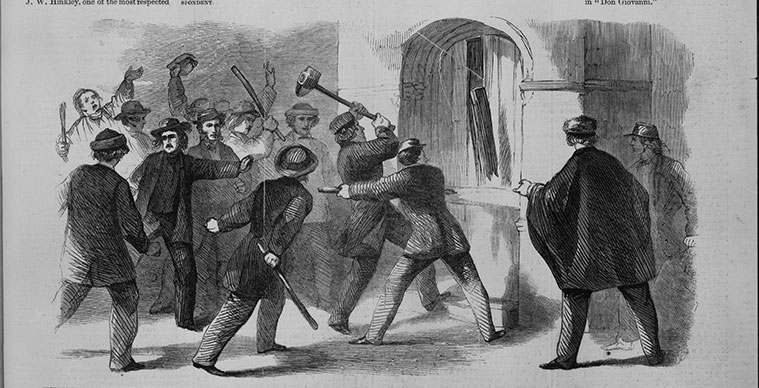On Breaking through Doors and Flipping Tables
I recently found myself able to identify with the American bobsledder, Johnny Quinn, as he punched his way through a stuck bathroom door in a Sochi hotel during the recent winter Olympic games. I identified with his story because I’ve often been a “door breaker” in my professional life.
I was born hard of hearing into a mostly hearing family. In high school, my hearing became progressively worse. During my undergraduate years at Ball State University I began my transition from being a “kid with ears that don’t work right” to a participant in a vibrant Deaf culture and community.
And I’ve been breaking down doors ever since.
I was the first Deaf person to attend the Iliff School of Theology. Once I discovered how much more happened in the classroom after an interpreter volunteered for one session of Theological Imagination and Construction, I requested interpreting for all my classes. They had little idea what to do with my request. It became additional work for me to resolve that situation.
I was the first Deaf person who used ASL as their primary language of communication in 100 years to be an ordained Elder in The United Methodist Church. My ordination interviews were awkward at times as they danced around what they could and couldn’t ask.
I was the first Deaf person to enroll in a doctoral program at the Boston University School of Theology and only the second Deaf person that I’m aware of worldwide to earn a PhD in theology. (Hats off to Rev. Dr. Hannah Lewis in the Liverpool diocese of the Anglican Church for being first!) I found myself once again explaining myself in addition to the usual work of being a doctoral student.
When I apply to teaching positions in the theological academy, I’m often the first Deaf person they’ve ever had contact their school. Disclosure is a constant worry of mine because I know the cost of providing ASL interpreters is a source of de facto discrimination in hiring despite the illegality of considering such factors. Yet my academic research interests provide enough indication that I am Deaf. Then there’s always the need to explain how to proceed with the “next phase” of a phone interview when the telephone is perhaps the most inaccessible thing on the planet for me.
Sigh.
Breaking down doors is hard work. Like Johnny Quinn, there’s amusement and a sense of achievement when I finally bust through a door. But there’s plenty of moments of horror that precede that when I realize just how stuck I am in a world where doors don’t open for me like they do for others.
Then, like Johnny Quinn, I’m forever remembered as “that guy who burst through the door” when all I really want to be is what I’ve spent a lot of time preparing, training, and working to become. In Quinn’s place, a world class bobsledder and Olympic athlete. In my case, a theologian with many things to contribute beyond what people may first notice about me.
So where do I find my balance?
In Deaf studies, the concept of Deaf gain is gaining traction as a means of articulating why the world needs Deaf people. This takes a step beyond the argument that says we have a right to exist on our own terms and argues that there are benefits to including Deaf people that go beyond benefiting just Deaf people.
This involves some turning of the tables. Like the experience of Deaf British performing artist Aaron Williamson, everyone told me I was losing my hearing, but no one ever told me I was gaining my Deafness. So to flip the tables and turn what everyone wants to call a loss into a gain provides me with a framework for addressing concerns about what I “cost” in the academy and gives me a reason directly address my being Deaf as an asset when self disclosing during an application process. Time will tell if this sort of strategy actually forestalls discrimination. In the meantime, it allows me a means to confront the issue directly with dignity and integrity.
 Kirk VanGilder, PhD, is the assistant professor of religion at Gallaudet University in Washington, DC. He is the author of Making Sadza With Deaf Zimbabwean Women: A Missiological Reorientation of Practical Theological Method published by Vandenhoeck and Ruprecht in 2012. He is also an ordained clergyperson in the United Methodist Church and has previously worked as a campus minister and parish minister in Deaf congregations. His current scholarly interests include interfaith studies, missiology, practical theological methods, Deaf studies, and narrative theology.
Kirk VanGilder, PhD, is the assistant professor of religion at Gallaudet University in Washington, DC. He is the author of Making Sadza With Deaf Zimbabwean Women: A Missiological Reorientation of Practical Theological Method published by Vandenhoeck and Ruprecht in 2012. He is also an ordained clergyperson in the United Methodist Church and has previously worked as a campus minister and parish minister in Deaf congregations. His current scholarly interests include interfaith studies, missiology, practical theological methods, Deaf studies, and narrative theology.
Image: "Southern secessionists raise flag at Yale College." Illus. in: Frank Leslie's illustrated newspaper, v. 11, no. 271 (1861 February 2), p. 173. via Library of Congress Prints and Photographs Division Washington, DC.






